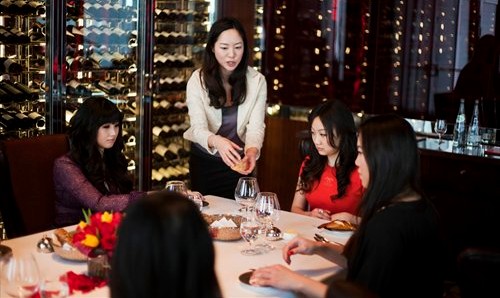 |
|
Sara Jane Ho, founder and principal of Institute Sarita, teaches students dining etiquette. Photo: Courtesy of Institute Sarita
|
Success of Chinese women is judged not only on their career achievements, but also by their role as wives and mothers.
On March 21, US first lady Michelle Obama began her maiden visit to China. In Beijing, she visited a local middle school accompanied by her Chinese counterpart Peng Liyuan. The pair also visited the Palace Museum and had a private dinner together.
World leaders' wives often spark public discussion about how their fashion, demeanor and etiquette influences diplomacy. In March 2013 when Peng accompanied husband Xi Jinping on his first foreign trip as Chinese president to Russia, she earned widespread respect and support for her grace, style and charisma.
As wives and mothers, women play a key role in maintaining family harmony. Historically, Chinese women were encouraged to obey their husbands and grown sons in line with the principle of xiangfu jiaozi, or literally "assist the husband in raising children."
The social status of Chinese women has risen greatly over past decades due to educated, successful women being held up as role models in academic, business and social circles.
Nevertheless, traditional gender expectations of women as nurturers of the family live on in China. Modern Chinese society might be less patriarchal today than in the past, but many women from the nouveau riche are eager to be model wives and mothers. And they are turning to the teachings of high-end finishing schools - not Confucianism - in their quest to be elite equals to their husbands.
Starting at finishing school
Founded by 29-year-old Hong Kong native Sara Jane Ho, Beijing-based finishing school Institute Sarita offers lessons in high-class etiquette. Classes on advanced table manners, appropriate posture and pronunciation are taught to help women feel more confident, elegant and gracious.
Students at the school also learn to assist their husbands in managing daily tasks, organize a children's party or private business dinner, arrange flowers and master the art of diplomatic etiquette. The 12-day program costs 100,000 yuan ($16,140).
Despite its hefty tuition fee, the program attracts many women eager to learn from Ho, a Harvard Business School graduate who studied for two months at a Swiss finishing school before she founded Institute Sarita last year.
"Interest has grown especially from southern and eastern cities, such as Shanghai and Guangzhou [in Guangdong Province]. In fact, 80 percent of our clients fly in from all over China to Beijing to take the course," said Ho.
"Our typical hostessing course client is a well-traveled woman in her 40s with a few children and her own business or a couple's business with her husband," she said.
Many Chinese women lured to finishing school want to improve their family business with their newfound etiquette skills.
"Unlike American or European women who are full-time housewives, Chinese housewives often play an active role in helping their husbands with business on top of managing the family and household," said Ho.
"We have a lot of clients whose businesses are expanding globally, or who are required to entertain international business contacts. They need a comprehensive system to learn how to host and take care of others."
Some of China's top universities have also started providing etiquette courses for women. In 2010, Peking University launched its Boya Juxian finishing school to educate women about improving their grace and charm. Apart from its female leadership program targeting business women, Boya Juxian also offers courses to middle- and upper-class housewives on family management, psychology, feng shui and wine tasting. The one-year program, divided into two-day classes held monthly, costs 59,800 yuan. More than 400 students have graduated from the program to date.
Liu Xu, a housewife and graduate of the program, says in a promotional video for the school that she achieved "internal refinement" through the program and can better assist her husband and raise her son.
We recommend:
